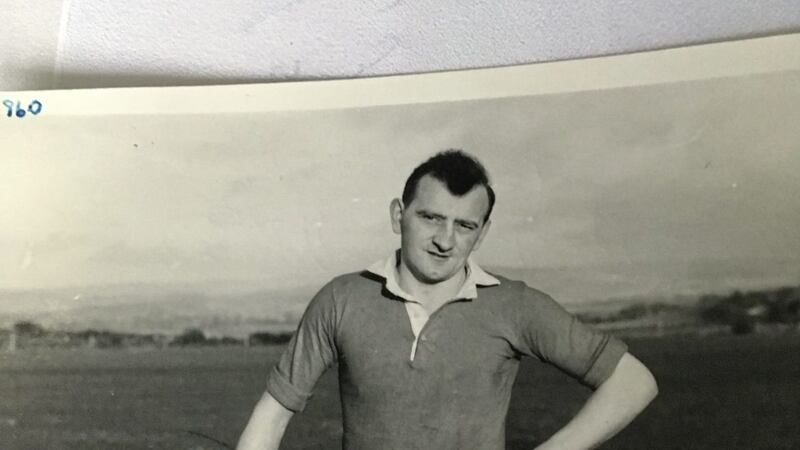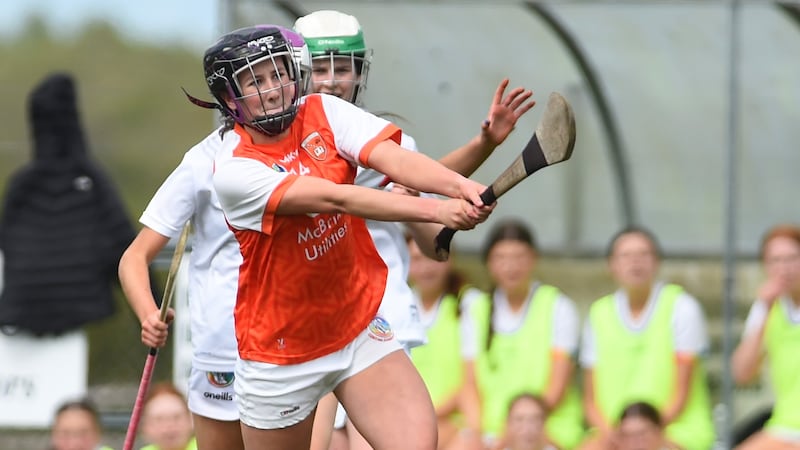“For when the great scorer comes to write against your name,
“He writes not that you won or lost, but how you played the game.”
Sean Kenny (1923-2002)
Captain of the 1950 Tipperary All-Ireland-winning team, in a letter to Michael Anderson.
MICHAEL Anderson had given up hope when a letter from America – the reply to a long-forgotten request - tumbled through his letterbox late in 2003.
Three years earlier, the GAA historian had begun writing to every living All-Ireland-winning hurling captain in the hope of compiling a record of their signatures.
Along with his letter of introduction, he enclosed a sheet of paper and a stamp-addressed envelope and it is testament to the familial bond between the stars and the fans of Gaelic Games that replies from legends of the caman code have arrived at his Poyntzpass home from Blackrock to Bagnelstown and Ballinalsoe to Hugginstown ever since.
The letter Michael received from Martin O’Doherty – the man who led Cork to the Liam MacCarthy Cup in 1977 – came as an unexpected and welcome surprise.
It turned out that Michael’s request for an autograph had been deliberately set to one side but his letter had become buried under the mounting layers of clutter on O’Doherty’s desk in Camarillo, California.
It remained there for three years until it was unearthed during a tidy-up.
“Like a lot of things in life, the letter was put aside and lost,” wrote O’Doherty.
“Recently I found it again and for this omission I apologise and I am now attaching a brief history of myself and my sporting career.”
What a career he had and what a life.
Born in Galway, O’Doherty was the seventh of nine children born to a Donegal-born salesman who relocated regularly.
“In or about 1962, we moved to Cork,” he wrote.
“I went to a local primary school and continued my sports on into secondary school at Colaiste Chriost Ri at Turners Cross. It was there that I began to make my impact on the Cork GAA front.
“In 1968, at age 16, I won an All-Ireland colleges medal with the school and went on to win the first of four All-Ireland minor medals with Cork the following September. That was the beginning of a dream that lasted until 1982.
“Over the next 14 years I had the good fortune of winning almost every honour in the game.”
O’Doherty won six Munster titles, three Allstars, All-Ireland titles with club Glen Rovers in 1972 and (as captain) 1976, four U21 All-Irelands to go along with his four minor medals as well as three senior titles.
He had the honour of collecting the Liam MacCarthy Cup after the Rebels beat Wexford 1-17 to 3-8 in the ’77 final.
“In 1979 I immigrated to the United States to pursue other interests,” he said.
“I went to college, got a degree in finance and worked in the aerospace business for 10 years before going to work in a family business. I recently went into business on my own.
“I played hurling and football with the local teams in southern California until I retired in 1997 at age 45.
“I mostly now coach soccer, but I always teach the kids how to solo with the ball. Maybe one day I’ll have an all-American Gaelic Football team.”
He added: “I go back to Ireland almost every year to play golf with the clan in Donegal and catch a big game in Croke Park. I have had a wonderful life and have great memories and my joy now is to watch the children try to achieve their dreams as I did.”
O’Doherty’s letter is just one piece of valuable GAA history Michael received. The oldest signature he has is from Cork’s Connie Buckley who lined out for the Rebels from 1934 until 1941 when he captained the county to their first All-Ireland title in a decade. Known as ‘Sonny’, Buckley died in 2009.
The most recent signature arrived last year from David Burke who was the skipper of the Galway team that won the Liam MacCarthy in 2017.
“Thank you very much for your letter of support,” wrote Burke.
“I would be greatly honoured to be added to your list.”
Of course, there are no Ulster captains in Michael’s collection. The closest any team from the northern province came to winning the All-Ireland were the Antrim teams of 1943 and 1989. The 1943 team lost to a Cork side captained by Mick Kennefick (only 19 at the time) while Terence McNaughton, Olcan McFeteridge and the men of ’89 were out-gunned by a Bobby Ryan-led Tipperary side in the final.
Tipp’s victory meant that Ryan’s signature takes pride of place on the page marked ‘1989’ instead of Antrim skipper Ciaran Barr, but Ulster does feature in a letter Michael received from three-time Tipperary All-Ireland winner Pat Stakelum.
The Holycross-Ballycahill clubman, regarded as one of the great centre backs in the game's history, captained Tipp to glory in 1949.
“It is a fervent wish I have to live to see someone from that great province of Ulster lift the MacCarthy Cup,” he wrote in 1999.
“It will be necessary for the Association to invest money in coaching the skills of the great game of hurling. I am sure the love of the game is as much in evidence in Down and Antrim and I am sure that through discipline, dedication and hard work dreams can be realized. May God speed the day.
“Get the young boys swinging the caman!”
Sadly Pat passed away in 2008 without seeing his wish for Ulster fulfilled.
Stakelum would have made his way home to Thurles from Croke Park disappointed in 1967 when Kilkenny got the better of their great rivals in a low scoring decider that finished 3-8 to 2-7.
But Kilkenny skipper Jim Treacy will never forget that day over 50 years ago.
“The highlight of my hurling career was when I captained the winning Kilkenny team in the 1967 All-Ireland,” he wrote.
That tradition continues to this day and over the years the surname ‘Fennelly’ has become synonymous with Kilkenny hurling. It first appears in 1979, the year Ger Fennelly skippered the Cats to glory.
“It was a great start to my inter-county career,” he wrote.
“I carried on until 1989 and was involved in six finals. Coming from a very successful club, Ballyhale Shamrocks, I won three All-Ireland club titles and had a very rewarding career.”
Four years later, Ger’s brother Liam had the honour of collecting the Liam MacCarthy and Liam was skipper again in 1992 when the Cats reigned supreme once again.
Seventeen years on and another Fennelly, their nephew Michael, did the same.
“It is an honour and a privilege to hurl for Kilkenny,” wrote Michael, the skipper of the men in black and amber in 2009.
“But never in my wildest dreams would I have thought of lifting the Liam MacCarthy Cup and following in the footsteps of my uncles in the 70s, 80s and 90s.”
The Fennellys were part of some of the great Kilkenny sides that dominated the game. Packed full of talented, determined hurlers, ‘the Cats’ have included some of the finest players and leaders the caman code has seen.
Eddie Keher, won six All-Ireland medals, 10 Leinster titles and three National Hurling Leagues. An All-Ireland runner-up four times, he also captained the Cats to All-Ireland victory in 1969.
He sent his signature with a note saying: “Honoured to be part of your exciting project.”
Keher’s career overlapped with Brian Cody’s. Now perhaps best known for his achievements as Kilkenny manager. Cody captained the 1982 winners.
“I hope you succeed in your aim of getting all the autographs,” he wrote.
When he switched from player to manager, Cody inherited a team bristling with ambition and flair and arguably the best of the bunch was the incomparable Henry Shefflin who won a record 10 All-Irelands and was captain in 2007.
“I feel honoured to be part of your great collection,” wrote the man known as ‘King Henry’.
“Please God I would like to see it one day and congrats on the great work and continued success with it.”
A year later, it was James Fitzpatrick’s turn to climb the Hogan Stand steps.
“It’s great to have people like you as interested in hurling and the GAA,” he wrote.
“If played properly, hurling is the greatest sporting spectacle.”
But Kilkenny haven’t had it all their own way over recent year. In 2013, a superb Clare side came out on top after a spell-binding Liam MacCarthy series. Clare had drawn their first meeting with Cork, but came out on top in the replay.
Captain Patrick Donnellan, one of only four men from his county to lift the greatest prize in hurling, wrote: “Thank you for the good wishes and best of luck in collecting the rest of the signatures.
“Come on the Banner!!”
A remarkable piece of work, Michael’s collection is an archive of the best of the best. Many of the names who are included in his book are true legends of the game of hurling who have featured in ‘Best of’ teams down through the years.
“It was just an idea that came into my mind,” said Michael, who is also a keen programme collector and has researched the family of Michael Cusack to England, Australia and the United States.
“I sent everybody a page and a stamp-addressed envelope, but a lot of the men ignored the page and sent me letters and photographs.
“It’s very touching to get that and people collect all sorts of things but I don’t know if anybody else would have that.”
He added: “I would have loved to have got Christy Ring (Cork captain in 1946, 1953 and 1954) but he had passed away before I started. I also tried to get Jack Lynch (Cork skipper in 1942 and a former Taoiseach) but unfortunately he wasn’t in good health and wasn’t in a position to sign it.
“Some of the men said they were honoured and delighted to be included and wished me all the best with my collection. It’s the spirit of the GAA and it’s a nice story when you read through them.”







